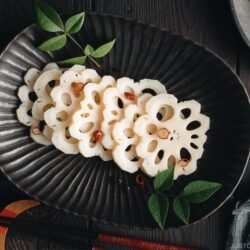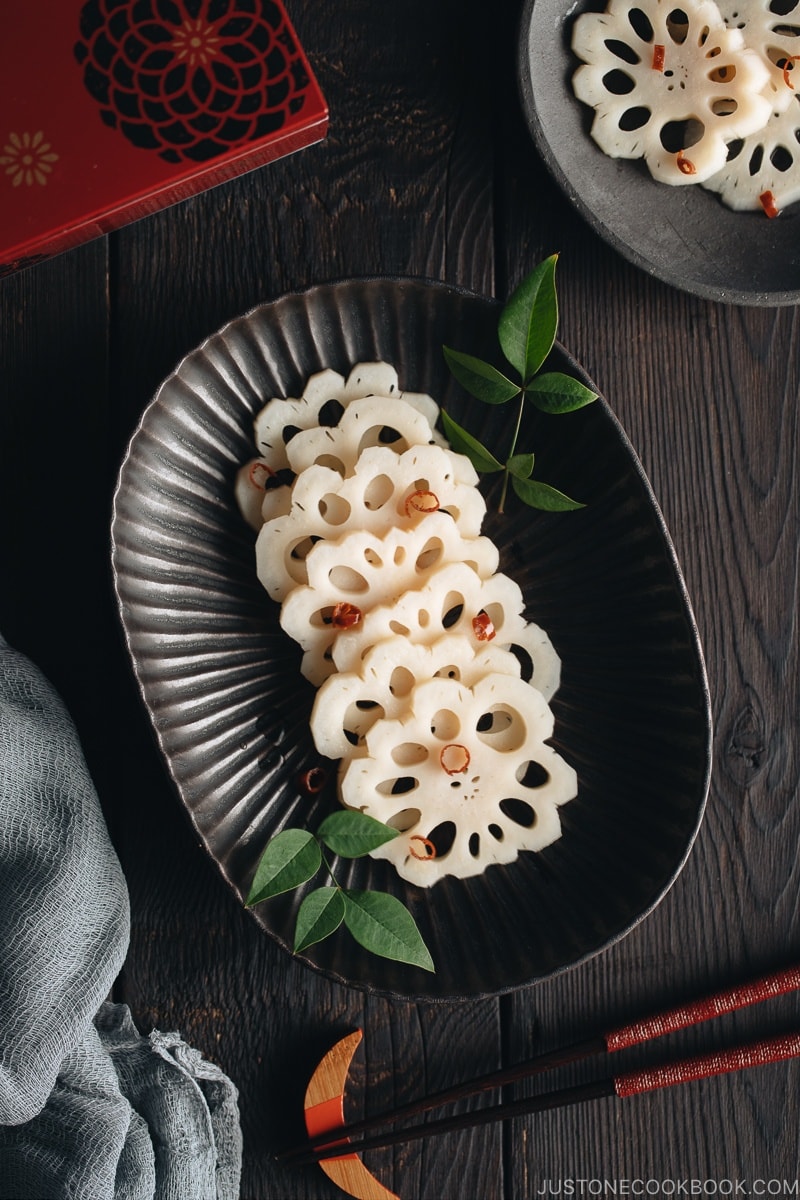
I always love lotus root for its beautiful natural design. The pale brown stem may look just like any other plant roots and characterless from the outside, but when you slice it open, the root reveals uneven tiny holes that are ready to surprise and delight. When sliced thinly, they even resemble delicate flowers.
Lotus root also has an incredibly unique texture because even after cooking, it retains its crunchiness while staying tender. Today I’m going to share Pickled Lotus Root recipe, or we call Su Renkon (酢れんこん) in Japanese.
What is Pickled Lotus Root (Su Renkon)?
Su Renkon (酢れんこん) is a pickled dish where sliced lotus roots are marinated in rice vinegar, sugar, salt, mirin, and red chili pepper. With a refreshing and piquant taste, this vinegared dish is great as a palette cleanser between heavily seasoned foods.
Because lotus root can oxidize after it is exposed to the air, we typically submerge it in the water with a little bit of vinegar or pickled in a vinegared sauce. This helps to remove any astringent taste and prevent the root from turning brown.
This dish is eaten all year round, but it is specially served as one of the Osechi Ryori, a Japanese New Year Food.
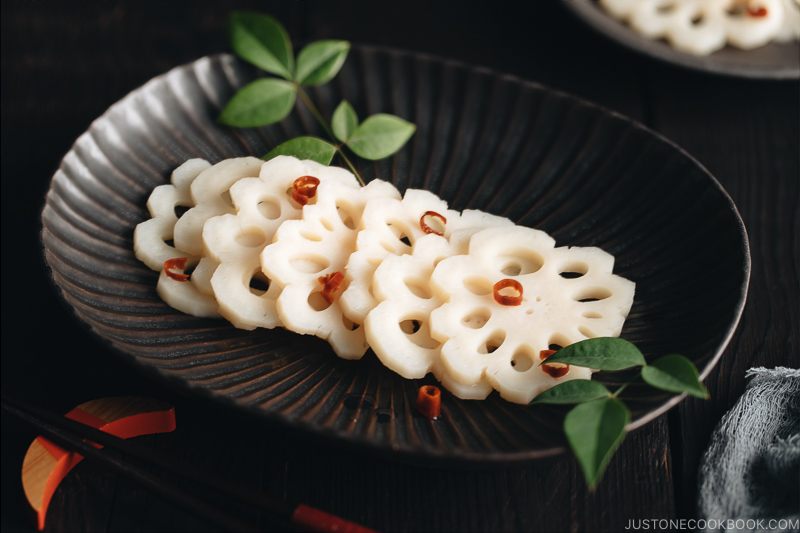
Pickled Lotus Root (Su Renkon) as Auspicious Food
Lotus root has been considered an auspicious food for the Japanese New Year because lotus root with its many holes is a symbol of an unobstructed view of the future. It also has many seeds, hence it’s been eaten to pray for the prosperity of descendants.
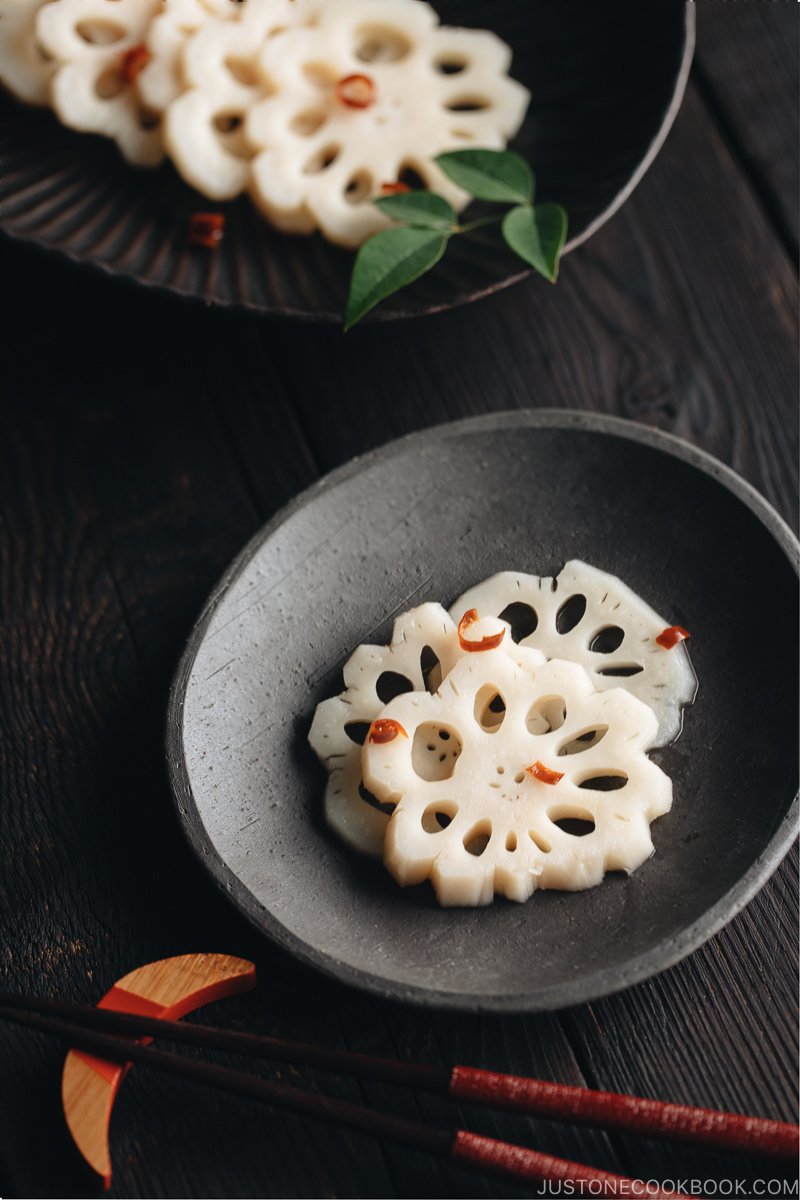
Optional – How to Make Flower Lotus Root (Hana Renkon)
You might be curious how we make this pretty flower pattern out of lotus root. It’s actually not so difficult, but you will need:
- Patience
- A very sharp paring knife
- Lotus root with even size holes
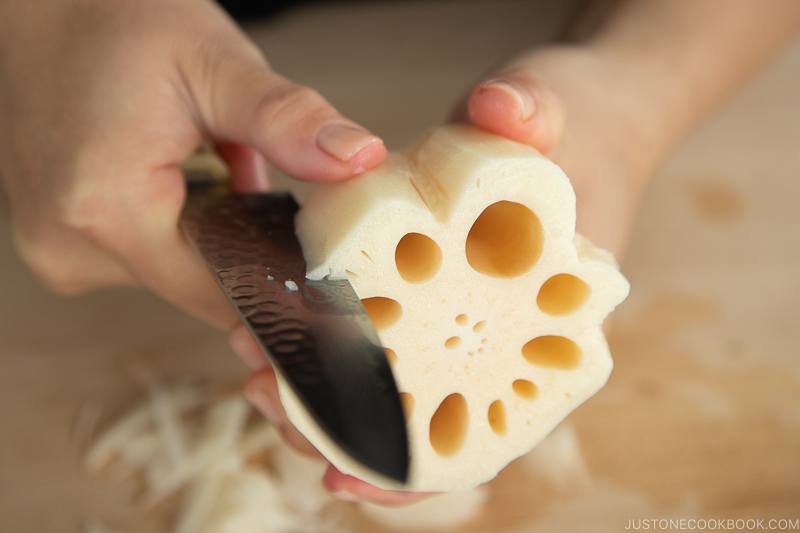
1. Cut lotus root into a 2-inch length so it’s easy to work with. Cut out the “V” shape between two holes.
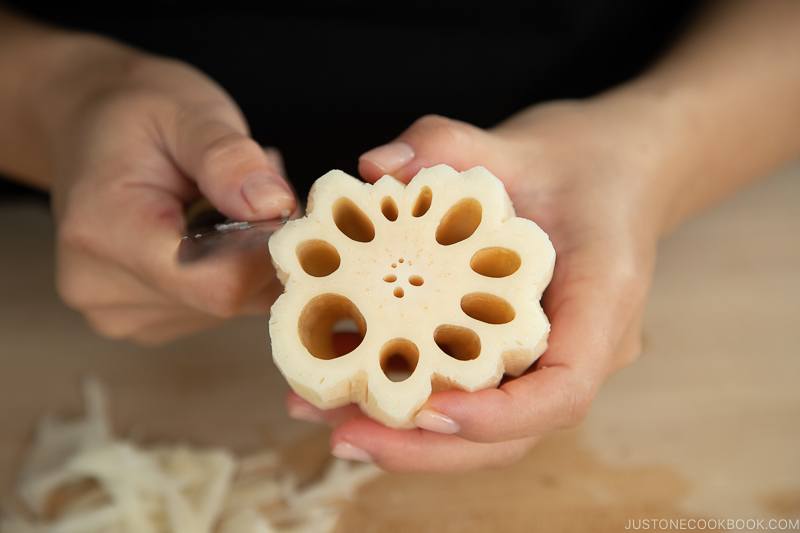
2. Remove the v-shape part and continue to next area between the holes.
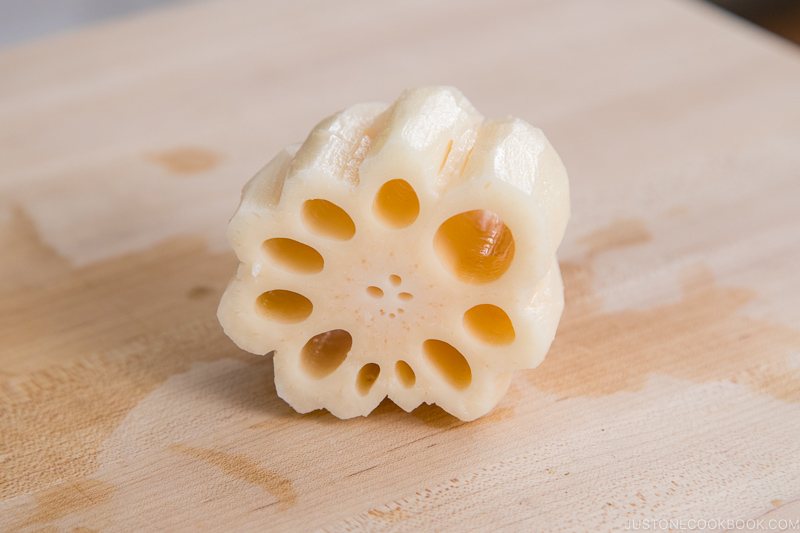
3. Now ready to cut into slices.
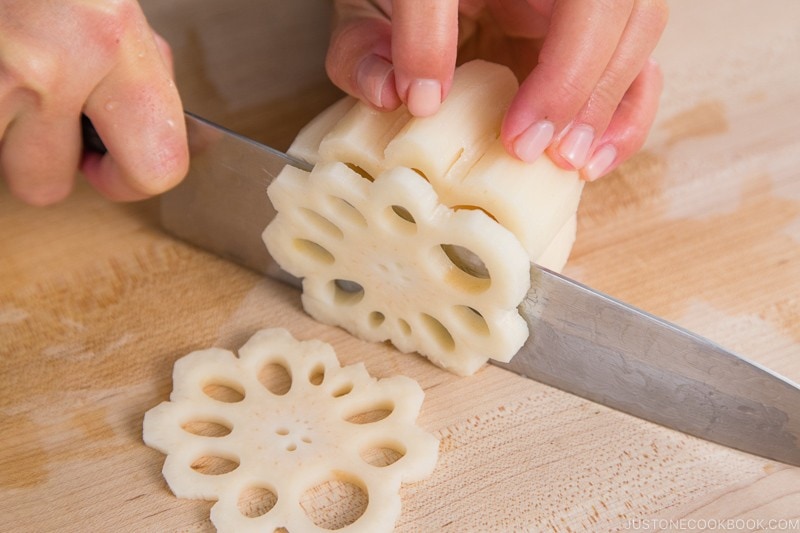
4. Slice into roughly 1/8 to 1/4 inch thick pieces.
Having a sharp knife helps you score the “V” shape and remove the excess part nicely. If you make a mistake, it’s okay. Move on to the next. Practice makes perfect.
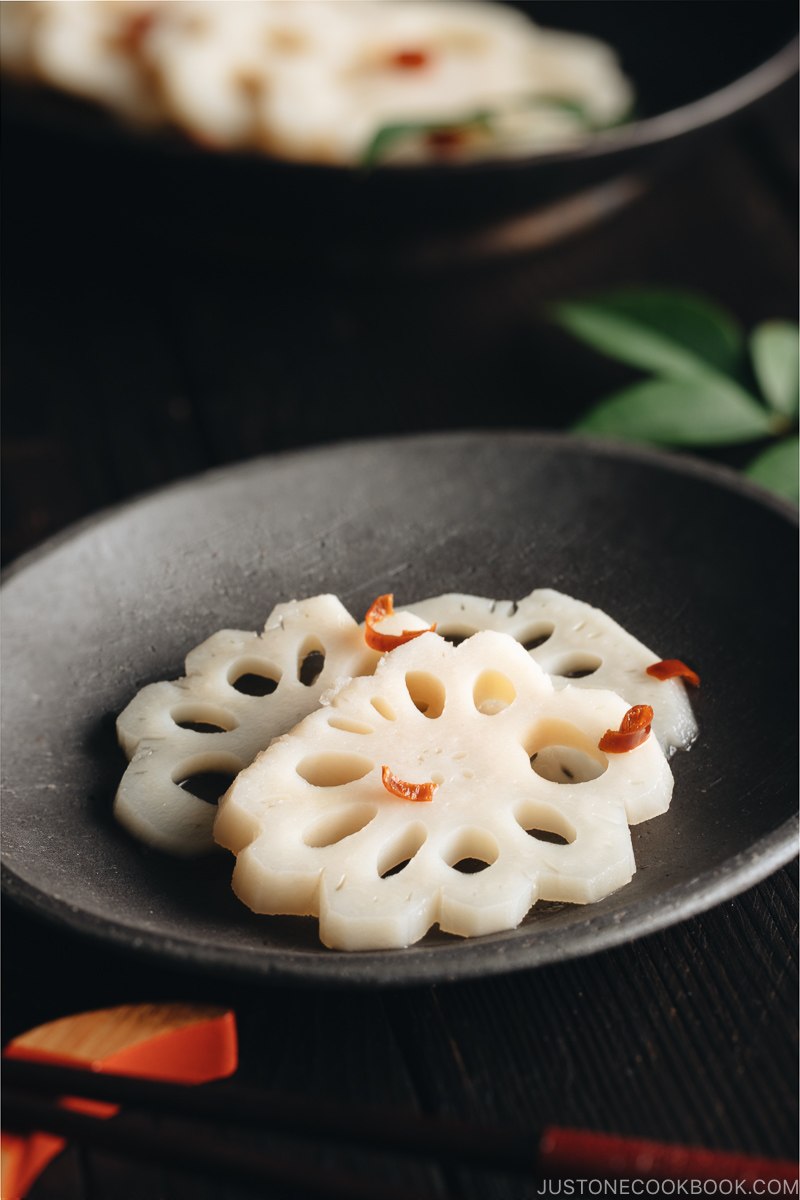
Other Lotus Root (Renkon) Dishes for the New Year’s Food
- Chikuzenni (Nishime) – root vegetables including lotus root are simmered along with the chicken.
- Kinpira Renkon – thinly sliced lotus root stir-fried and seasoned with sauce.
- Karashi Renkon – a mixture of miso and Japanese karashi hot mustard stuffed in lotus root, coated in a turmeric flour batter, and deep-fried.
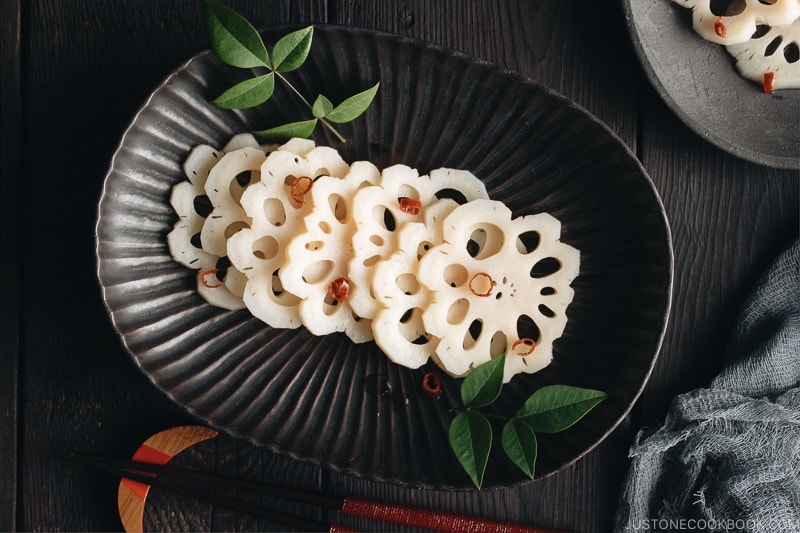
Wish to learn more about Japanese cooking? Sign up for our free newsletter to receive cooking tips & recipe updates! And stay in touch with me on Facebook, Pinterest, YouTube, and Instagram.
Pickled Lotus Root (Su Renkon)
Ingredients
- 1 lotus root (renkon) (7 oz, 200 g)
- 1 tsp rice vinegar (unseasoned) (for soaking the lotus root)
- 4 cups water (for soaking the lotus root)
For the Seasonings
- ¾ cup water (for soaking the kombu to make Kombu Dashi)
- 1 piece kombu (dried kelp) (5 g; 2 x 2 inches, 5 x 5 cm per piece)
- ½ cup rice vinegar (unseasoned)
- 3 Tbsp sugar (add more if the solution is too tangy)
- ¾ tsp Diamond Crystal kosher salt
- 1 dried red chili pepper
Instructions
Before You Start…
- Please note that this recipe requires a soaking time of at least 6 hours. If you will include this dish in your Osechi meal, I recommend preparing it up to 3 days before you plan to serve. For more helpful tips on planning your Japanese New Year feast, please read my A 5-Day Osechi Cooking Timeline blog post.
- Gather all the ingredients.
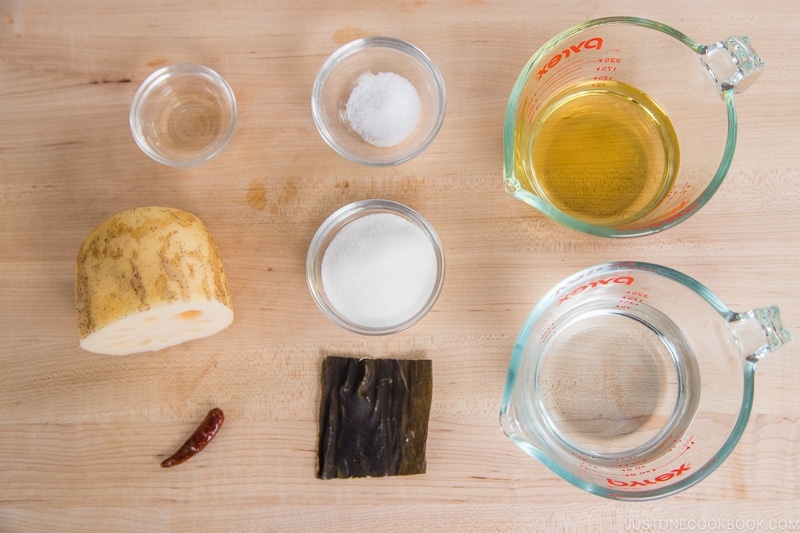
To Prepare the Ingredients
- Soak 1 piece kombu (dried kelp) in ¾ cup water. After 30 minutes, you now have cold brew Kombu Dashi.
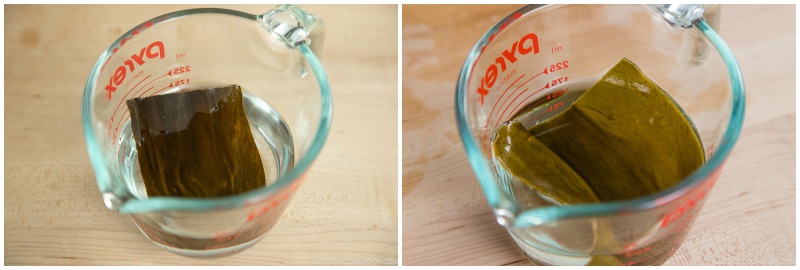
- Meanwhile, peel 1 lotus root (renkon). If you want to make the lotus root into a flower shape, see Optional Steps 1 and 2 below. Otherwise, slice the lotus root into ¼-inch (6-mm) rounds.
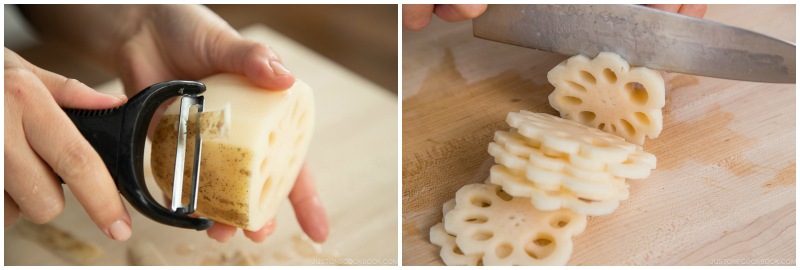
- Optional Step 1: To make flower-shaped lotus root (Hana Renkon), cut the lotus root into a 2-inch length so it’s easy to work with. Next, cut out a V-shaped notch between two holes and along the length of the root.

- Optional Step 2: Continue cutting between the holes until you‘ve cut around the entire outside of the root. The cross section of your lotus root should now resemble a flower. Then, cut the root into ¼-inch slices (0.6 mm).

- Add the lotus root slices to a bowl with vinegared water made from 1 tsp rice vinegar (unseasoned) and 4 cups water. Soak the lotus root slices for 5 minutes to prevent them from changing color and to remove the astringent taste.
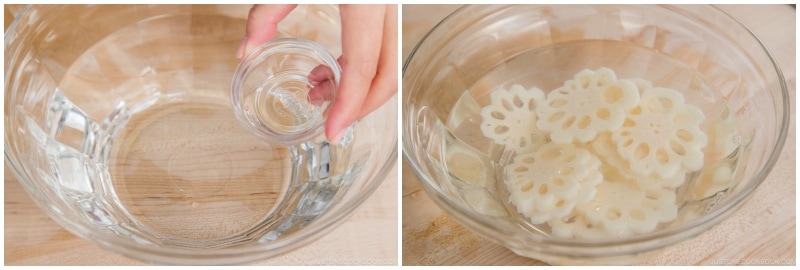
To Cook
- In a medium saucepan, combine the kombu dashi (with the kombu), ½ cup rice vinegar (unseasoned), 3 Tbsp sugar, and ¾ tsp Diamond Crystal kosher salt. Turn on the heat to medium heat and mix well.

- Add the lotus root slices and spread them out evenly in the liquid.
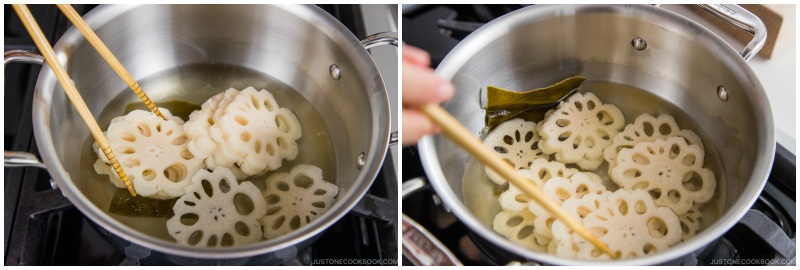
- Right before the sauce comes to a full boil, remove the kombu; you can reserve it to make Simmered Kombu (Kombu Tsukudani) or Homemade Furikake (Rice Seasoning). Next, put an otoshibuta (drop lid) on the lotus root. If you don‘t have one, you can make an otoshibuta with aluminum foil.
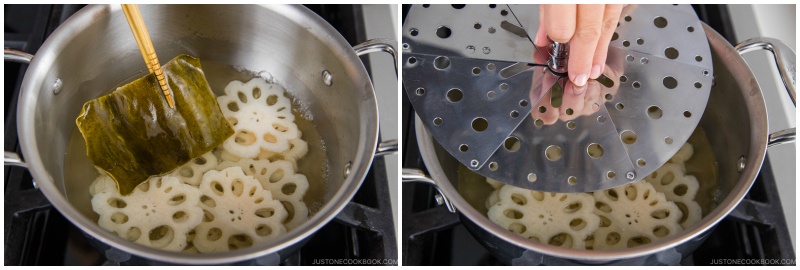
- Cook with the otoshibuta on for 5-8 minutes, or until an inserted skewer pierces the root easily.
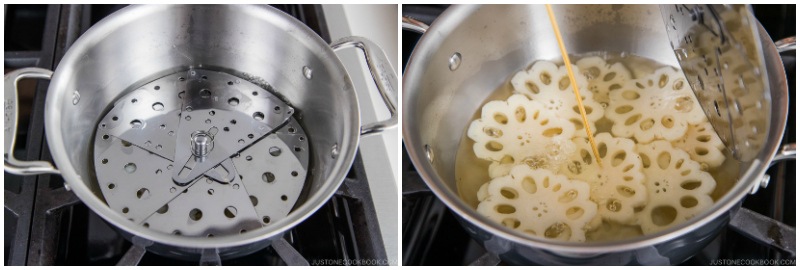
- Transfer the lotus root and sauce to an airtight container with a lid.
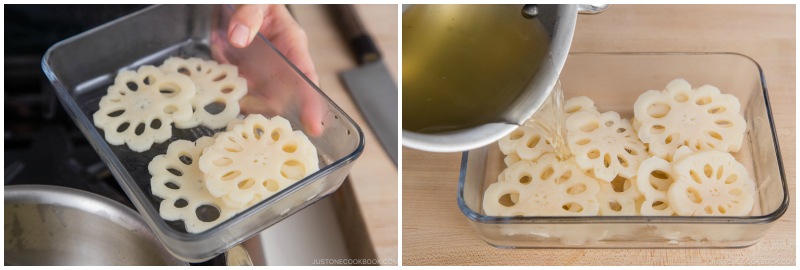
- Remove the seeds from 1 dried red chili pepper (or keep some if you like it spicy), and slice the chili pepper into thin rounds.
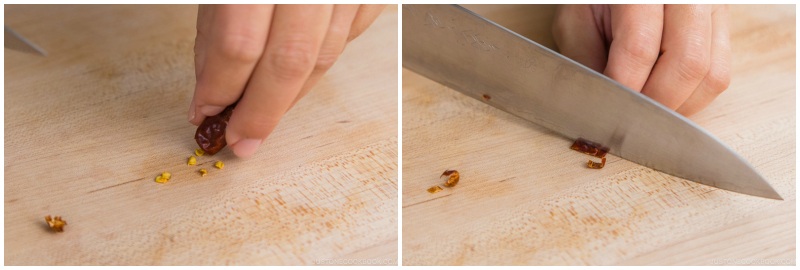
- Place the red chili pepper rounds in the sauce. Let the lotus root cool completely. Then, store it in the refrigerator to soak for at least 6 hours so the flavors absorb completely.
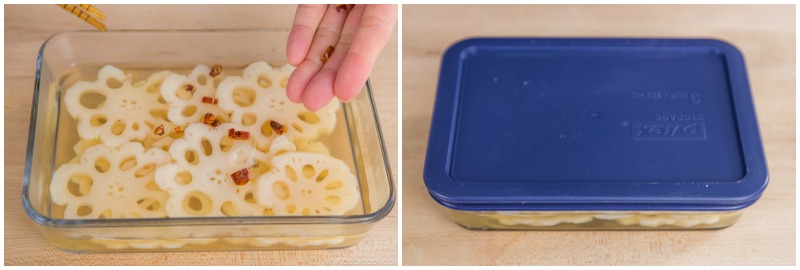
To Serve and Store
- Enjoy the Pickled Lotus Root either chilled or at room temperature. You can keep it in the refrigerator for up to 5–7 days and in the freezer for up to a month. Make sure the lotus root slices are covered in the sauce during storage.
Nutrition
Did you make this recipe?
Tag @justonecookbook on Instagram so we can see your delicious creation!


